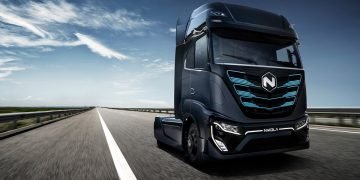As the logistics industry continues to seek more sustainable solutions to meet growing demands, hydrogen-powered trucks are emerging as a promising alternative to traditional diesel-powered vehicles. With their potential to reduce carbon emissions, improve fuel efficiency, and offer longer ranges compared to battery-electric vehicles, hydrogen trucks could be a game-changer for the future of transportation and logistics.
The Environmental Benefits of Hydrogen Trucks
Hydrogen-powered trucks are seen as a key solution to the logistics sector’s carbon footprint challenge. Unlike conventional diesel trucks, hydrogen trucks emit only water vapor as a byproduct, making them significantly more eco-friendly. As governments worldwide implement stricter emissions regulations, hydrogen vehicles offer a sustainable alternative that could help logistics companies meet these requirements without compromising operational efficiency.
Hydrogen fuel cells are particularly suited to long-haul trucking, where electric vehicles with large battery packs may struggle to meet range requirements. Hydrogen trucks refuel quickly and can travel long distances, making them ideal for intercity, cross-country, and long-distance logistics operations.
Overcoming Challenges in Hydrogen Infrastructure
Despite the many advantages of hydrogen trucks, widespread adoption faces challenges related to infrastructure. One of the primary barriers is the lack of refueling stations. Hydrogen infrastructure is still in the early stages of development, with limited fueling stations available in certain regions. However, governments and private companies are investing in the expansion of hydrogen refueling networks to support the growing demand for hydrogen-powered vehicles.
Moreover, the cost of producing hydrogen fuel remains high, though advancements in production technologies and economies of scale are expected to drive costs down in the coming years.
Hydrogen Trucks in Logistics: A Viable Solution for the Future
Several major logistics companies are already exploring or adopting hydrogen-powered trucks. Companies like DHL, Volvo, and Daimler are testing and deploying hydrogen trucks in select regions, aiming to pave the way for a greener, more sustainable logistics network. As the technology matures and the infrastructure develops, the integration of hydrogen-powered trucks into global supply chains will increase.
In addition to environmental benefits, hydrogen trucks offer operational advantages. Their longer range and faster refueling times make them an attractive choice for logistics companies that require reliability and efficiency in their fleet operations.
The Road Ahead for Hydrogen Trucks in Logistics
The future of logistics is shifting toward cleaner and more sustainable solutions, and hydrogen-powered trucks are likely to play a crucial role in that transition. As the technology continues to evolve and infrastructure gaps are addressed, hydrogen trucks could become a mainstream option for logistics companies worldwide.
With growing global efforts to decarbonize industries and combat climate change, the logistics sector is under increasing pressure to adopt greener solutions. Hydrogen-powered trucks represent a viable solution to these challenges, offering the promise of a cleaner, more efficient, and sustainable future for the logistics industry.
Stay informed with the latest advancements in sustainable logistics and clean transportation technologies with The Logistic News.
#HydrogenTrucks #SustainableLogistics #CleanEnergy #TransportInnovation #FuelCellTechnology #LogisticsIndustry #CarbonEmissions #GreenLogistics #FutureofTransportation























